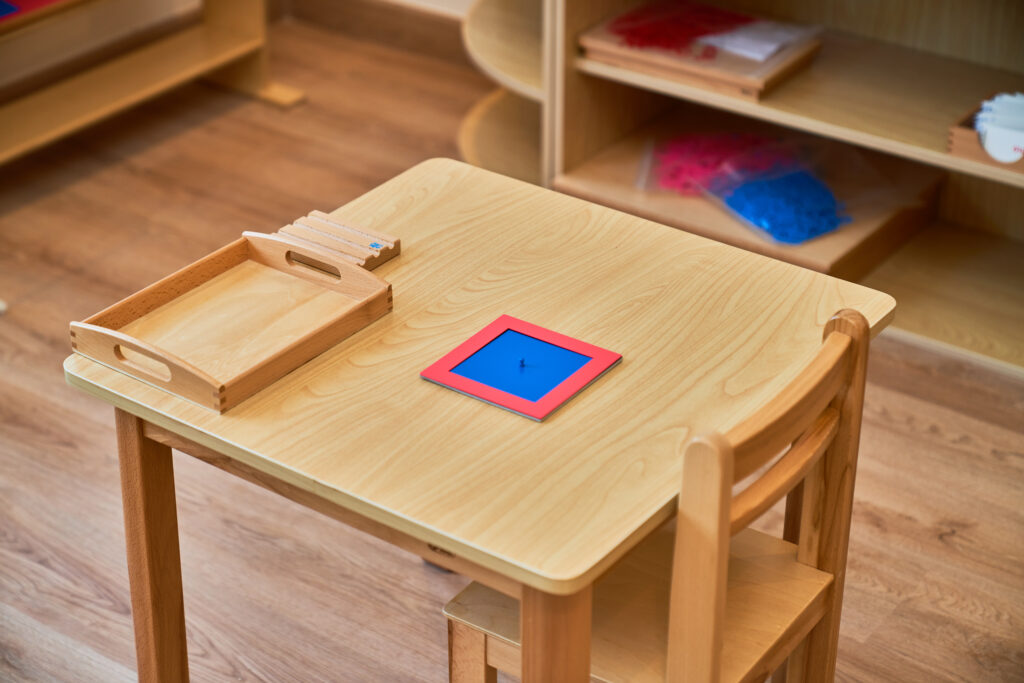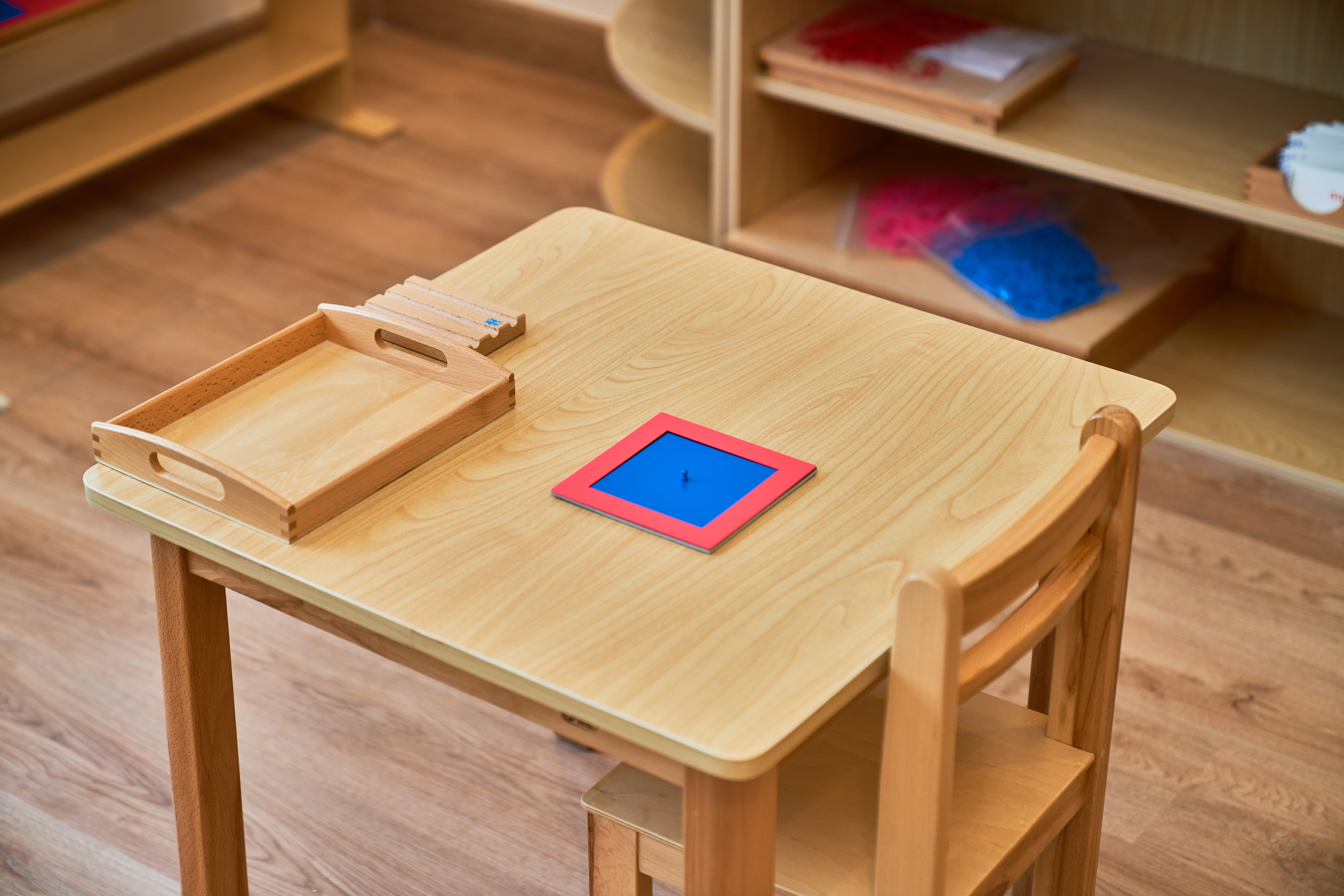Considering child care options? Discover the differences between Montessori schools and daycare centers, in order to make the right choice for your family.

The first six years of a child’s life are foundational, as during this time, nearly 80% of the brain is formed. It is during these early years that the building blocks of the brain’s structure and function are laid down. For this reason, the early years are of critical importance because they play a vital role in shaping the trajectory of the child’s future and lay the essential foundations for their adult life. The experiences, interactions, and learning opportunities a child receives during this period profoundly influence their cognitive, emotional, and social development, setting the stage for a successful and fulfilling adulthood. Investing in a supportive and nurturing environment during these formative years can have a lasting positive impact on a child’s overall development and well-being throughout their life journey.
When deciding whether to enroll your child in daycare, careful consideration is essential. This decision goes beyond it being the first time your child spends a substantial amount of time away from home; it’s also about recognizing the profound impact daycare can have on your child’s growth and development.
As Montessori gains increasing global recognition as an effective educational approach for young children, more families are contemplating it as a daycare option. Nevertheless, while Montessori schools and daycare centers both aim to cater to the needs of young children, the methods they employ to address those needs — and the resulting outcomes — differ significantly.
Academic achievement
While there’s initially no notable disparity in intelligence levels among young children entering preschool, those enrolled in Montessori schools exhibit accelerated progress in reading, vocabulary, and numerical comprehension. The substantial achievement gap often observed between the most and least successful students in terms of academic development can be attributed to two key external factors: family income and executive functioning skills, including working memory and self-control. Remarkably, attending Montessori schools not only elevates academic standards but also diminishes the achievement gap. Consequently, children from less affluent families and those lacking executive functioning skills essentially bridge the gap and catch up with their peers in the class.
Social Development
Montessori is indeed a holistic approach to education that goes beyond academic learning. The mixed-age setting in Montessori classrooms is a fundamental aspect of this approach, promoting a rich and diverse learning environment.
In a mixed-age classroom, children have the opportunity to interact with peers of different ages, allowing for a natural exchange of knowledge and experiences. Older children often act as role models and mentors, guiding and assisting younger children in their learning journey. This collaborative environment fosters a sense of community and cooperation, promoting social and emotional development.
By interacting with peers of varying ages, children learn valuable social skills, including communication, empathy, and conflict resolution. They learn to work together on projects, share ideas, and respect each other’s perspectives. This sense of community also nurtures a strong sense of belonging, contributing to a positive and supportive learning atmosphere.
Montessori educators recognize each child as an individual with unique needs and interests, and they provide personalized support to cater to these differences. However, a significant part of the learning process in Montessori involves experiencing life as part of a community. Children engage in real-life problem-solving, collaboration, and decision-making, preparing them for active participation in society and helping them develop essential life skills beyond academics.
An education for life beyond school
Montessori education is renowned for its focus on preparing children for life, not just for academic success within the confines of a classroom. The unique teaching style and principles of Montessori contribute to this comprehensive preparation.
In Montessori classrooms, children are encouraged to learn at their individual pace. This approach fosters a genuine understanding of concepts, as children have the time and space to delve into subjects deeply and make connections based on their own interests and readiness. Children in Montessori have the freedom to repeat activities until they achieve mastery. This practice ensures that knowledge is not simply memorized temporarily but internalized, leading to a deeper understanding and retention of concepts. Additonally, Montessori materials are designed to be manipulative, allowing children to engage their hands and senses in the learning process. This hands-on approach facilitates a concrete understanding of abstract concepts, leading to more profound learning experiences.
Montessori empowers children to choose their activities within the prepared environment. This autonomy cultivates a sense of responsibility and ownership over their education, instilling a love for learning and intrinsic motivation.
Montessori education emphasizes both intellectual and practical life skills. Children learn not only academic subjects but also essential life skills, such as problem-solving, critical thinking, and independence, which are applicable to real-life situations.
In the Practical Life area, children engage in a variety of everyday activities that are purposeful and meaningful to their daily lives. These activities may include:
- Pouring Exercises: Children practice pouring liquids from one container to another, which not only develops fine motor skills but also teaches them about precision and control.
- Transferring Activities: Children transfer objects like beans or rice using tweezers or a spoon, enhancing their hand-eye coordination and concentration.
- Buttoning and Fastening: Children learn how to button shirts, zip up jackets, or fasten snaps, promoting independence and self-help skills.
- Polishing: Children polish different objects, such as silverware or shoes, fostering attention to detail and a sense of responsibility for their belongings.
- Washing Activities: Children learn to wash dishes or scrub tables, developing practical life skills while also understanding the importance of cleanliness and tidiness.
- Care of Plants and Animals: Children take care of plants or classroom pets, teaching them about nurturing and responsibility.
- Setting the Table: Children learn how to set the table for meals, promoting a sense of order and cooperation in a communal setting.
While engaging in these practical life activities, children are simultaneously developing essential life skills, such as problem-solving, critical thinking, and independence:
- Problem-Solving: Children encounter real-life challenges during practical life activities, like spilling water while pouring. They learn to identify the issue, think of solutions, and implement strategies to address the problem effectively.
- Critical Thinking: Practical life activities involve making decisions and following a sequence of steps. Children learn to analyze tasks, plan their actions, and adapt if needed, enhancing their critical thinking abilities.
- Independence: As children engage in practical life activities, they gradually become more self-reliant and capable of taking care of their needs, fostering independence and self-confidence.
- Applicability to Real-Life Situations: The skills children acquire in the Practical Life area directly translate to their daily lives outside the classroom. They can use these skills to contribute to their families and communities, enhancing their sense of responsibility and engagement in real-life situations.
Montessori education recognizes and respects the unique qualities of each child. By focusing on individual strengths and interests, children develop a strong sense of self-confidence and self-awareness, enabling them to navigate life’s challenges with a positive self-concept.
Montessori curriculum emphasizes cultural awareness and diversity. Children learn about different cultures, traditions, and customs, fostering empathy, tolerance, and open-mindedness towards people from various backgrounds.
Montessori classrooms provide opportunities for children to practice conflict resolution and effective communication. These crucial interpersonal skills are valuable for building and maintaining healthy relationships throughout life.
Montessori’s mixed-age classrooms promote leadership and collaboration. Older children often take on leadership roles, and younger children learn to collaborate effectively. These experiences prepare them to be effective team members and leaders in the future.
Typical day in a Montessori setting
Walking into a Montessori classroom is indeed a unique and awe-inspiring experience. The atmosphere exudes a sense of calmness and order that immediately captures one’s attention. In contrast to traditional classrooms, you won’t find a teacher’s desk or a blackboard, as Montessori classrooms are designed to function differently.
Children in a Montessori classroom are seen working independently or collaboratively in small groups. The environment is purposefully arranged to be minimalistic and beautiful, with carefully chosen materials that captivate the child’s curiosity and desire to learn.
In a Montessori setting, the teacher plays a distinct role as the “environment.” Rather than being the center of attention, the teacher acts as a guide, observing the children’s interests and needs, and connecting them to the appropriate learning materials. The materials themselves are scientifically designed to isolate specific qualities and one difficulty at a time, making the learning process clear and engaging.
One of the striking differences in a Montessori classroom is the uninterrupted work cycles. Children have the freedom to choose their activities and explore concepts at their own pace and based on their individual interests. This approach ensures that learning is tailored to each child’s developmental stage, allowing them to fully absorb and internalize the concepts they encounter.
The environment in a Montessori classroom fosters independence, concentration, and a love for learning. It encourages children to be self-directed in their exploration of knowledge and provides a supportive space for them to develop critical skills such as problem-solving, decision-making, and time management.
A babysitting service or a catalyst for development?
What distinguishes Montessori from other daycare choices is its strong reliance on observation and scientific experimentation. In a Montessori school, every learning material and aspect of the environment is the product of extensive trial and error. The method’s founder dedicated years to understanding which activities and learning materials best supported the development of young children under her care. This foundation in research and experimentation has earned Montessori the title of “scientific pedagogy.” Unlike other childcare options, Montessori is uniquely grounded in scientific facts and overarching principles about children’s growth and development.

